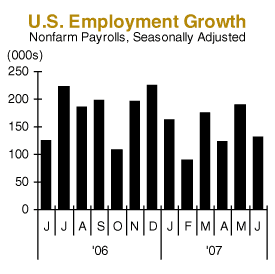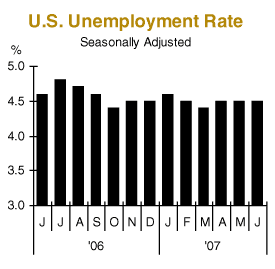|
July 11, 2007
Job Solid
Written by Jeff Thredgold, CSP, President, Thredgold Economic Associates
U.S. job creation continued at a solid pace during June with the net addition of 132,000 jobs. The reported gain was very close to the 125,000 job consensus estimate of economists. Of note: job creation estimates of the two prior months were revised higher by 75,000 jobs. The U.S. economy added an average of 145,000 net new jobs monthly in 2007’s first six months, down 23% from the 189,000 average monthly pace during 2006. 
The U.S. unemployment rate was 4.5% in June, matching an identical rate in the two prior months. March’s 4.4% jobless rate matched that of October 2006 as the lowest in more than five years.
Where the Jobs Were…and Were Not
Goods-producing employment declined in June, with a net loss of 3,000 jobs. Manufacturing employment fell by 18,000 positions (following a loss of 7,000 jobs in May), offset in part by commercial real estate’s construction employment rise of 12,000 jobs.
The net rise in construction employment has drawn numerous doubters as to the accuracy of the Bureau of Labor Statistics data. Critics argue that severe weakness in new single-family home construction in numerous markets around the nation suggests that thousands of additional layoffs should have been reported to date. Others note that widespread strength in the nation’s nonresidential construction market…that of office buildings, retail space, apartments, industrial buildings, highways and the like…has led thousands of skilled construction workers to move to the “commercial” construction side.
 As usual, service-providing employment led the way in June with a rise of 135,000 net new jobs. The education & health services sector added 59,000 net new positions, while the government sector added 40,000 jobs. The leisure & hospitality sector added 39,000 net new jobs. The retail trade sector lost 24,000 positions, while the professional & business services sector (in most months one of the job creation leaders) lost an estimated 9,000 jobs in June. As usual, service-providing employment led the way in June with a rise of 135,000 net new jobs. The education & health services sector added 59,000 net new positions, while the government sector added 40,000 jobs. The leisure & hospitality sector added 39,000 net new jobs. The retail trade sector lost 24,000 positions, while the professional & business services sector (in most months one of the job creation leaders) lost an estimated 9,000 jobs in June.
The average hourly wage rose 0.3% (six cents) to $17.38 hourly, a rise of 3.9% over the past 12 months. The increase outpaced the 2.7% rise in consumer prices over the most recent 12-month period ending in May.
If It Ain’t Broke…
Solid employment gains of the past 18 months, wages rising near a 4.0% annual rate, and continued tight labor market conditions support the Federal Reserve’s “bias” toward inflation containment in the economy. As discussed in last week’s Tea Leaf, the Federal Reserve has essentially no reason to deviate from current monetary policy. The current 5.25% federal funds rate, in place and unchanged since June 29, 2006, is unlikely to change anytime soon.

Seeing the Future
The American economy is an amazing, complex, flexible, and powerful entity…
The scenario:
Step back to mid-2004. At that time, widespread media frenzy has developed around a highly-regarded psychic…
| |
 |
She notes in lucid terms that she has seen the future three years hence…mid-2007
|
| |
 |
She notes that oil prices are above $70 per barrel and have averaged $60-$65 a barrel for the past 2-3 years. She reports that a gallon of gasoline is now $3.00-$3.75 per gallon in most parts of the country
|
| |
 |
She notes that many communities around the nation—particularly on both coasts and in the Southwest—are dealing with weak home sales, declining home prices, an excess of properties to sell, climbing delinquencies and foreclosures, and the highest mortgage interest rates in five years
|
| |
 |
She notes that a number of the nation’s largest Wall Street firms are dealing with a painful sub-prime mortgage lending market and rising anxiety about which Wall Street firms might follow Bear Stearns with serious valuation problems of aggressive hedge funds
|
| |
 |
She notes that the euro, the British pound, and the Canadian dollar are each at record or multi-year highs against the dollar. She notes that gold prices have more than doubled since the summer of 2004, in part tied to anxiety about the U.S. dollar
|
| |
 |
She notes that the Federal Reserve is about to end the recent 12-month period of a 46-year low in short-term interest rates. She announces that the Fed will tighten monetary policy 17 times between now (June 2004) and June 2006
|
| |
 |
She notes that our ill-advised foray into Iraq has bogged down, with more and more national Republican politicians distancing themselves from a widely unpopular President. She notes that by one measure, the Congress—now under control by the Democrats—has an approval rating by the general public of 14%, the lowest ever
|
| |
 |
She articulates a handful of other emotional issues that have risen in prominence by mid-2007, including health care, illegal immigration, global warming, and the future of entitlement spending |
Given this laundry list of anxiety and negativity, the consensus view of economic forecasters and the media would no doubt be that a serious recession would soon engulf the U.S. economy, with millions of newly unemployed people, rising inflation, huge budget deficits, and little chance of escaping the economic decline. Financial market players would likely be wringing their collective hands about how this combination of challenges would ravage the stock market…
…not exactly
In fact, U.S. economic growth has been solid. The stock market has set dozens of new highs during the past nine months. The combined net worth of American households has set 17 consecutive quarterly records and now stands near $56 trillion. Budget deficits are declining, while inflation remains under control. Labor markets are extremely tight, with widespread opportunities for millions of people who want to work.
The American economy is an amazing, complex, flexible, and powerful entity…
…exactly
Email this article to a friend
|
|
Subscribe to the Tea Leaf
Like what you just read? Have Jeff Thredgold’s Tea Leaf emailed to you free each week. Subscribe today.
|
|
|

“Tea”ser
The nice part about being a pessimist is that you are constantly being either proven right or pleasantly surprised.
Send us a “Tea”ser of your own.

“Tea”stimonial
“Thank you for your presentation at our annual meeting. The evaluations on your presentation were far and away the best. In fact, over the last dozen years I do not recall a speaker with a higher rating.”
—Jim Melland, President, Economic Development Association of North Dakota
More testimonials
Invite Jeff Thredgold to speak at your next conference, meeting, or client function
If you like the Tea Leaf, you’ll love Jeff Thredgold’s live presentations. Jeff takes your audience on a timely, engaging, and entertaining tour of the U.S. economy and financial markets. Debunking some of today’s most common economic myths, he offers a clear picture of how the American economy is really performing and what that means for the future of your finances.
|

